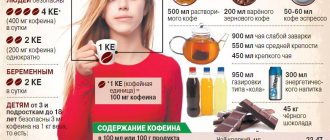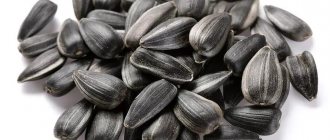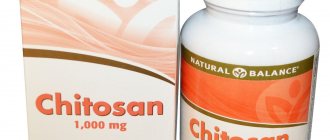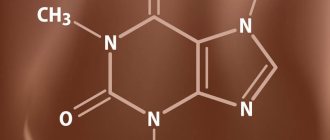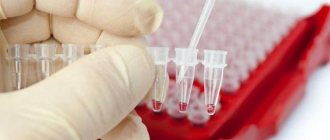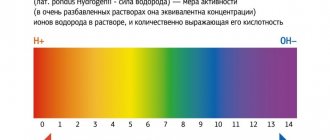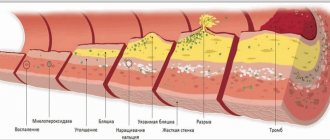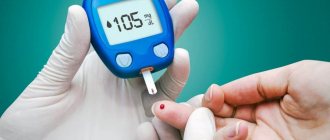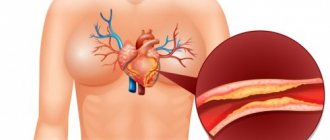Elevated cholesterol levels are one of the leading factors in the development of atherosclerosis of large vital arteries. The condition provokes serious disorders in the body, which lead to a decrease in daily activity, disability and death from diseases such as coronary heart disease, heart failure, myocardial infarction, stroke, etc.
One of the effective herbal remedies to combat pathology is ginger root. It has proven itself well and has successfully passed several clinical trials.
According to research results, it was found that taking ginger reduces triglycerides and low-density lipoproteins (“bad” cholesterol) in the blood.
Other useful properties
Ginger contains more than 300 different components, which determine its benefits and possible harm to the body. The most significant components are:
- Amino acids. The product is rich in arginine, valine, isoleucine, threonine. These protein formations are indispensable for the body, as they are not synthesized independently.
- The most important modulators of metabolism in bone tissue and the synthesis of enzymes (phosphorus, calcium, iron, copper, magnesium).
- Elements that provide taste and flavorings (zingiberene, gingerol).
- Vitamins (A, B1, B2, C).
The combined interaction of the active components provides the following effects on the cardiovascular system:
- Improvement of microcirculation in distal arterioles. Tissues suffer less from hypoxia, and the disposal of toxic metabolic products is accelerated.
- Weak dilatation effect. Smooth muscle cells, receiving many calcium ions, relax and reduce blood pressure.
- Reducing blood viscosity and improving blood flow. The blood thinning effect is achieved due to the fact that lowering the number of atherogenic lipoproteins prevents the formation of atherosclerotic plaques, which are prone to ulceration. The formation of an open defect on the inner membrane is always accompanied by increased coagulation and the imposition of thrombotic masses with the development of fatal complications (IBM, myocardial infarction, strokes during thrombosis of the carotid and intracranial arteries). Additionally, vitamin C helps reduce platelet coagulation.
Ginger also has an effect on other body systems. The effects include:
- Acceleration of metabolism (prevention of obesity, even against the background of physical inactivity).
- Analgesic, anti-inflammatory and antipyretic effects. Pain relief is achieved by blocking cyclooxygenase at the site of injury, slowing down infiltrative changes - by ensuring control of the permeability of capillary walls for mediators, and an antipyretic effect - by influencing the thermoregulation center in the hypothalamus.
- Antimicrobial action. Effective against most gram-positive microorganisms. No pathogenic effect on other representatives of the bacterial kingdom has been identified.
- Acceleration of gastrointestinal motility and increased secretion of intestinal juice (implemented by activating bile production).
Ginger for atherosclerosis
At the moment, it is known that the root vegetable strengthens blood vessels, but how can it help with atherosclerosis? The answer is simple - by itself, reducing blood pressure, ginger root perfectly complements any type of treatment for atherosclerosis . Improves blood circulation. Reduces the risk of blockage of blood vessels due to atherosclerosis, as it prevents the formation of platelets.
Main indications for use
It is especially recommended to use ginger for people suffering from the following disorders:
- Hypertension (including symptomatic arterial hypertension).
- Edema syndrome (with CHF, pathologies of the lymphatic system).
- Coronary heart disease of any functional class.
- Tendency to tachyarrhythmias (presence in anamnesis).
- Chronic diseases of the gastrointestinal tract in remission.
- Atrophic pathologies of the digestive tube (chemical burns, enzymatic deficiency, etc.).
- The presence of benign tumor processes in the body.
- Upper respiratory tract infections. The root vegetable helps reduce bacterial contamination and accelerates the healing of damage to the mucous membrane.
- Fever.
- Joint diseases (arthritis, arthrosis, osteoarthritis).
- Diabetes mellitus type II.
- Atherosclerosis.
- Microangiopathies against the background of obliterating endarteritis of the lower extremities, type II diabetes mellitus, gout and atherosclerosis.
Contraindications
The list of contraindications is no less wide. It is prohibited to take when:
- peptic ulcer of the stomach and duodenum (increased risk of bleeding);
- external and internal bleeding of any origin (helps reduce the rate of thrombosis of damaged vessels);
- diabetes mellitus type I.
- conditions after myocardial infarction, acute cerebrovascular accident, transistor ischemic attack (within 1 month from the date of occurrence);
- increased individual sensitivity to individual components of a member of the Zingiberaceae family.
- pregnancy and lactation;
- taking any drugs that affect blood viscosity or have antiplatelet and anticoagulation effects (substances potentiate each other’s action, which leads to an increased risk of developing hemorrhages);
- obesity (spices increase appetite).
In 1% of cases, adverse reactions may develop. The most common of these are:
- allergies (angioedema, urticaria, isolated skin itching, irritation of the mucous membranes of the oral cavity);
- dyspeptic disorders (nausea, vomiting, belching of gastric contents).
Expert commentary
Kardash Anton Borisovich
Therapist, cardiologist. Doctor of the highest category.
Under no circumstances should you start taking ginger to treat the diseases described above on your own. It is recommended to consult a doctor and get a full consultation. Making any decision regarding therapy is a responsible step that requires a competent approach!
How to take it correctly - 6 recipes
The high content of vitamins, microelements, amino acids and other substances has ensured the wide popularity of ginger. Many recipes have been developed to cleanse the blood of high cholesterol levels.
Ginger tea
Anti-cholesterol ginger tea is prepared as follows:
- 3 tbsp. l. Finely grated ginger root and pour 1 liter of cold water.
- Bring to a boil and simmer over low heat for 10-15 minutes.
- Then cool to a temperature of 40 degrees and add 2 tsp. honey.
How many days should you drink tea if you have high cholesterol? You should take 200 ml 2-3 times a day. The safe maximum daily dose of tea is 1.5 liters.
To taste and improve the pharmacological action, it is allowed to add mint, lemon or orange slices, or green tea to ginger tea.
Decoction
To prepare, you need the root of the plant, which is cut into small pieces and poured with 600 ml of boiling water.
After this, the solution should be simmered over low heat for 20-25 minutes and cooled for 30-40 minutes.
You need to consume 50 ml 5-7 times a day. The course of treatment is 3-4 weeks.
Tincture
The tincture is prepared as follows:
- Ginger root should be cut into thin slices. A sausage cutting device is ideal for this.
- The raw materials are filled with vodka at the rate of 0.5 liters of alcohol-containing liquid per 200 g of plant.
- The resulting product must be infused in a glass container in a dark, cool place for about 14 days, shaking occasionally (once every 2-3 days).
- Before direct use, the solution is filtered.
The drug is taken orally, 1 tbsp. l. 2 times a day.
The duration of treatment is no more than 1 month. The product has a pronounced antihypercholesterolemic effect and helps improve immunity.
Vitamin mixture to improve immunity
For preparation you will need:
- 250 g ginger root;
- 1 lemon (it’s better to take a large one);
- 100 g honey.
Recipe for preparing the mixture:
- Grind the root vegetable using any available method (blender, grater, knife).
- Pour boiling water over the lemon and grate it (the zest also needs to be used), remove the seeds.
- Add honey to the mixture and mix well.
- It is better to store the finished composition in a hermetically sealed glass container in the refrigerator.
Can be taken immediately after preparation, 3-4 tbsp. l. 2 times a day.
Cinnamon drink
This combination is highly effective for atherosclerosis and diseases of the gastrointestinal tract with severe secretory insufficiency.
To prepare you will need:
- ½ tsp. ground cinnamon;
- 1 tsp ginger powder or 6 tbsp. l. finely chopped plant root.
The components should be poured with 250 ml of boiling water and left for 2-3 hours. You need to drink it at one time before eating. To improve the taste, you can add 1-2 tsp. honey. The course of treatment involves 2 weeks of systematic use of the drink.
Garlic-ginger infusion
Cooking process:
- You will need to take a pre-grated medium-sized root; 2 cloves of garlic (preferably fresh), which is pre-grated on a fine grater or passed through a press.
- The ingredients must be mixed and poured into 1 liter of boiling water, then left for 4 hours.
- The finished solution after filtering is ready for use.
Dosage regimen: 200 ml 2 times a day before meals (preferably before breakfast and lunch). The course of therapy is no more than 14 days, then a break for a week, and the treatment can be repeated.
Rules of ginger herbal medicine
As with any treatment, with ginger herbal medicine you need to take into account some subtleties:
- You should choose only fresh roots, without mold, even and smooth.
- It is recommended to take it from morning until lunch, i.e. in the first half of the day.
- It is necessary to choose the optimal dosage, focusing on individual tolerance.
- Ginger drinks, tinctures and mixtures should be taken 30 minutes before meals.
- In summer it is worth limiting the intake of the root.
The rules are simple, by adhering to them, you will get the maximum benefit from the treatment.
Did you know? Ginger therapy helps women fight PMS and cope with menopause more easily.
Review of drugs based on it
Many manufacturers produce ginger-based medicines. Particularly effective in reducing cholesterol levels are drugs such as:
- Tea Evalar. In addition to the main active ingredient ginger, the composition includes: white willow bark (helps eliminate swelling), lemon balm (has a general sedative effect and improves taste), linden (increases antiviral immunity), thyme (eliminates chronic fatigue and activates metabolism), fruits rosehip (improves the rheological properties of blood and increases the sensitivity of insulin receptors, allowing increased glucose utilization). The drug is recommended for the treatment of metabolic syndrome, in which increased cholesterol levels are the leading pathogenetic link. Drink 200 ml of prepared tea 2 times a day (brew 1 filter bag in 1 cup of boiling water and let steep for 10 minutes).
- Arthromaximum 5 days. The active ingredient is extracts of 5 plants: ginger, boswellia, burdock, turmeric and white willow. The drug is effective for high blood cholesterol levels, arterial hypertension and joint diseases accompanied by a feeling of morning stiffness (rheumatoid arthritis). Dosage regimen: the first 5 days – 2 caps. per day, then 1 caps. per day for 40 days.
- Sunthi. It is produced by an American pharmaceutical corporation. Contains natural ginger extract and is indicated for various gastrointestinal disorders and respiratory viral infections. The medication also has a general strengthening effect and reduces the level of atherogenic cholesterol. You need to take 1 capsule 2 times a day 0.5-1 hour after meals with a glass of warm water.
Action of gingerol
Gingerol accelerates metabolic processes that promote the conversion of cholesterol molecules into bile acids, which enhances the catabolism of cholesterol and determines its release outside the body in feces.
Anti-inflammatory actions relieve inflammation of the arterial membranes, increasing their elasticity, and increasing the speed of blood flow in them. Cholesterol plaques begin to dissolve, and high-density lipoproteins remove them from the bloodstream into liver cells for disposal.
In addition to these properties, ginger prevents the development of cancer tumors in the human body.
In relation to cholesterol, ginger root exhibits antagonistic actions:
- Removes atherosclerotic deposits from the bloodstream;
- Removes toxins from the body after alcohol intoxication;
- Helps restore the body after food poisoning, as well as radiation intoxication.
For an effective effect on the body, it is enough to consume 2.0 grams of ginger per day.

